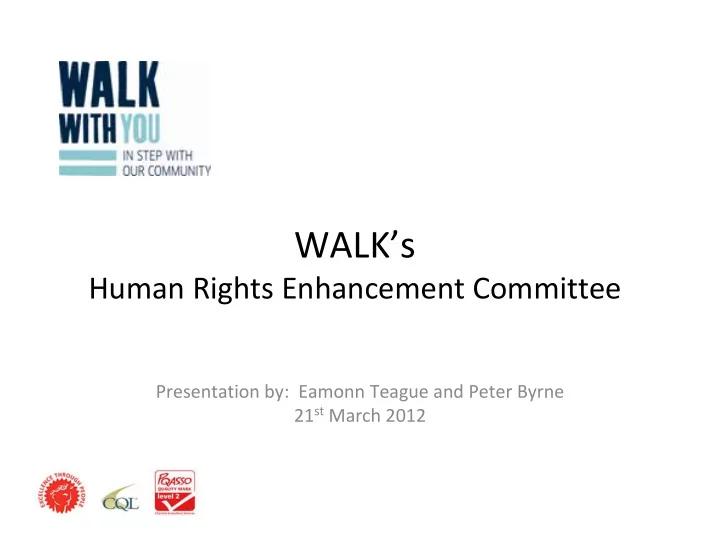

WALK’s Human Rights Enhancement Committee Presentation by: Eamonn Teague and Peter Byrne 21 st March 2012
What is the main aim of WALK? To support people with an intellectual disability to lead self determined lives in socially inclusive communities How does the Human Rights Enhancement Committee help this aim? All rights issues which cannot be resolved using other means can be referred to the Human Rights Enhancement Committee. This means that no restriction on a person’s right to choose how they want to live can be put in place by our organisation unless due process has been followed.
Why did we decide to set up the committee? WALK engaged in an accreditation process with an organisation called CQL. One area of importance for us was around promoting least restrictive practices in services. International Best Practice was reviewed. People in WALK did training with Amnesty International on human rights.
What is the process for referrals to the Committee? Referrals are made in many different ways: ‐ Personal outcomes processes ‐ Complaints procedure ‐ Incident reporting system ‐ Verbal discussions with staff ‐ Rights restriction forms ‐ Communications Audits ‐ Meetings The committee secretary receives this information and discusses the issue with the person and those who support them. This encourages early resolution of the restriction. The secretary also gathers more information about the restriction so that when the Committee or Subcommittee meet they have enough information.
What is the process for referrals to the Committee? The committee reviews the referral and makes the following recommendations: The restriction is lifted and the case is closed. The restriction is partially lifted. This means that additional supports are put in place for the person as part of plan to encourage full removing of the restriction. The case will be reviewed in a specified timeframe. The restriction remains in place. Recommendations are issued. The case is followed up on in a specified time frame depending on the case.
Who sits on the Committee? There are more external members on the committee than internal members. Human Rights background – Amnesty, • Masters Programme NUI. Service User Representative • Legal • Educators – Nursing (DCU), Social Care • (OU). Disabiity Sector specialism – Autism • Independent Advocate • Family Representative – WALK family rep • and Inclusion Ireland Representative Volunteer • Quality Specialist • Clinical •
Why do we have External People? • Internally we do not have all the answers. • Enhance and diversify skill sets • It helps to ensure that due process is followed. • It provides us with a different perspective on how to provide least restrictive services. Confirmation of appropriateness of restrictions .
Why do we have so many External People? • It ensures we are not self policing • It enables us to challenge our own standards/expectations and reduces potential for complacency. • It provides us an independent viewpoint when dealing with issues concerning other services and/or family members.
This is an example of a case from the committee • Person early 50’s. • History self injurious behaviour and restrictive response • Move from institutional setting to community based residential services • Coping mechanisms versus restrictions
• Stress Management Plan • Night time routine • Hospital visit and access • Support with money management • Support with choice • Listening and complaints • Rebuilding relationships • Review regular .
This is an example of a case from the committee Person mid 30’s, background of alcohol and • aggression. Autism • Special interests and rituals = moped • Information processing / Social stories • Budget planning • Community Gardai • Theory test •
“Hope is the expectation that something outside of ourselves, something or someone external is going to come to our rescue and we will live happily ever after” Dr Robert Anthony Thank you for your attention.
Recommend
More recommend